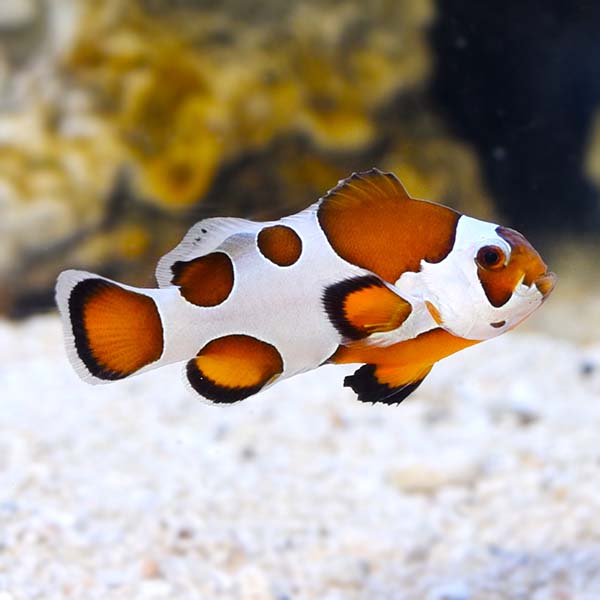Storm Clown Fish
Are you looking for a unique and fascinating addition to your saltwater aquarium? Look no further than the breathtaking storm clown fish. With their striking colors and energetic personalities, these fish are sure to be a highlight of your tank.
Pain Points for Storm Clown Fish
Before adding any new fish to your aquarium, it's important to consider the potential pain points. Storm clown fish are no exception, as they can be more challenging to care for than some other species. These fish require specific water conditions, including a pH between 8.1 and 8.4 and a temperature between 75 and 82 degrees Fahrenheit. They also need plenty of hiding places and a varied diet that includes both meaty foods and algae-based options. Failing to meet these needs can lead to stress, illness, and even death for your storm clown fish.
Target of Storm Clown Fish
If you're up for the challenge of caring for storm clown fish, you'll be rewarded with one of the most unique and striking fish species available. These fish are known for their brightly colored patterns, which range from deep blacks to vibrant oranges. Storm clown fish also have lively personalities, often darting playfully around the tank and interacting with their environment. Their ability to form strong bonds with their tank mates and even their owners only adds to their charm.
So, if you're looking for a visually stunning and engaging addition to your saltwater aquarium, consider adding a storm clown fish to your collection.
Benefits of Choosing Storm Clown Fish
There are many reasons to consider storm clown fish as your next aquarium addition. These fish are incredibly unique, with their signature patterns and colors standing out from the crowd. They're also fun to watch, with an energetic and playful personality that will keep you entertained for hours. Finally, storm clown fish are a great choice for those looking to form meaningful connections with their fish, as they often form strong social bonds within their aquarium communities.
How to Care for Your Storm Clown Fish
Caring for storm clown fish requires careful attention to their environment and diet. These fish thrive in aquariums with plenty of hiding places, including rocks, caves, and live plants. They also need a varied diet that includes both meaty foods, like brine shrimp or small pieces of fish, and algae-based options, like seaweed sheets or spirulina flakes. Additionally, it's important to maintain specific water conditions, including a pH between 8.1 and 8.4 and a temperature between 75 and 82 degrees Fahrenheit.
Tips for Introducing Storm Clown Fish to Your Aquarium
When introducing storm clown fish to your aquarium, it's important to do so slowly and carefully. These fish can be skittish, so it's best to give them plenty of time to explore their new surroundings before introducing any other fish. It's also important to slowly acclimate them to their new water conditions by gradually increasing the salinity level over the course of several days. Finally, be sure to carefully monitor your storm clown fish as they adjust to their new home, watching for any signs of illness or stress that may indicate a need for additional attention.
Question and Answer
Q: Are storm clown fish compatible with all types of aquariums?
A: While storm clown fish can be a great addition to many types of aquariums, it's important to carefully consider their specific needs before introducing them to your tank. For example, these fish require specific water conditions and hiding places, so it's important to ensure that your aquarium can meet these requirements before bringing in a storm clown fish.
Q: What should I feed my storm clown fish?
A: Storm clown fish require a varied diet that includes both meaty foods, like brine shrimp or small pieces of fish, and algae-based options, like seaweed sheets or spirulina flakes. It's important to offer a mix of these foods to ensure that your storm clown fish receive all of the nutrients they need to thrive.
Q: Are storm clown fish aggressive toward other fish?
A: While storm clown fish can be territorial, they are generally not aggressive toward other fish in their aquarium community. However, it's important to introduce new fish slowly and carefully to ensure that your storm clown fish do not become stressed or territorial.
Q: How can I tell if my storm clown fish is healthy?
A: Healthy storm clown fish will be active and alert, swimming energetically around their tank. They should also have a healthy appetite and exhibit no signs of stress or illness, like hiding or lethargy.
Conclusion of Storm Clown Fish
Storm clown fish are a unique and captivating addition to any saltwater aquarium. While they require specific care and attention, the rewards of their striking colors, lively personalities, and strong social bonds are well worth the effort. With the proper care and attention, storm clown fish can thrive in your aquarium and bring joy to your daily life.
Gallery
Orange Storm Clownfish, Captive-Bred: Saltwater Aquarium Fish For

Photo Credit by: bing.com / orange clownfish storm fish captive bred saltwater identical variations approximate provided species due within range note please look size
CORAL RARITIES: 3 New Clownfish Variants From Sea & Reef

Photo Credit by: bing.com / clownfish orange storm real reef coral variants rarities sea greater understanding genetics result they life manipulated
Black Storm Clowns | Clown Fish, Marine Tank, Fish Pet

Photo Credit by: bing.com / clowns clownfish
A Black Storm (Clownfish) On The Horizon

Photo Credit by: bing.com / clownfish storm horizon macna pedersen matt credit another display
A Black Storm (Clownfish) On The Horizon

Photo Credit by: bing.com / clownfish storm designer fish clown horizon orleans macna pedersen matt credit display august aquarium